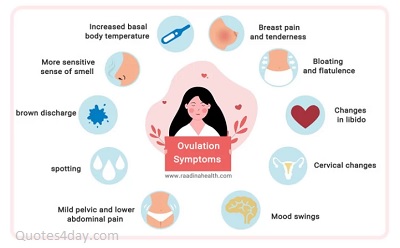Understanding the processes that occur with the body is a must-have for a modern woman. Especially in such a matter as the menstrual cycle. In this article, let’s talk about its key part – ovulation. What happens to our bodies during this period? What are its signs? Why does the pain occur and should I immediately worry about them?

What happens to the body during ovulation?
Ovulation is part of the natural menstrual cycle. Under the influence of the hormone estradiol (part of the estrogen group), the egg leaves the ovary and becomes ready for fertilization. The follicle ruptures, the egg is released into the abdominal cavity, and then enters the fallopian tube. And although without fertilization, she can live only 12-24 hours, in the fallopian tubes, spermatozoa can “wait” for their beauty for up to 5 days.
Ovulation occurs approximately in the middle of the menstrual cycle, on the 14th day from its start, or 10-16 days before the start of the next period.
There is also early ovulation on the 7th-10th day of the cycle, and not as a one-time occurrence, but as a regular one. If you think this is your case, follow the sensations. Severe pain can be a signal to make an appointment with a doctor.
The menstrual cycle consists of three phases:
- Follicular. Estrogens affect the formation and maturation of the follicle with the egg.
- Ovulatory. The egg is released and ready for fertilization.
- Luteal. The corpus luteum phase during which the body prepares for the probable attachment of a fertilized egg to the endometrium. If this does not happen, the layers of the endometrium are shed and a new menstrual cycle starts.
Main Symptoms of Ovulation
It is important to notice the symptoms of ovulation both when planning a pregnancy and in the absence of a desire to become a mother. In the first case, you will know when to plan a romantic evening with your loved one, in the second case, you will be able to avoid unplanned surprises.
The main signs that your body is preparing for fertilization:
- The consistency of the discharge has changed;
- Increased basal body temperature;
- Feel the growth of sexual desire;
- Pain in the ovaries or lower abdomen.
Additional symptoms may include bloating and breast tenderness.
The main sign of ovulation is discharged. Cervical mucus, which in other periods performs a barrier function in the cervix, becomes more liquid and viscous, reminiscent of egg white in consistency. This change is inherent to facilitate the transport of spermatozoa and make it possible for them to meet with the egg.
Basal body temperature is the lower limit of your body temperature during a period without physical activity, with maximum relaxation. That is why this indicator is most often removed immediately after waking up. Keep in mind that even banal to get up and go to the toilet will already lead to an error.
To get an accurate result, you will need a special thermometer, strict adherence to the same measurement time, and a permanent place (mouth, vagina, and anus are suitable).
Interesting on the topic How to Lose Weight Safely and Naturally: Your Complete Plan
In the follicular phase, the temperature is lower than in the luteal phase. By creating a chart for the month, you can see the period when it starts to grow. In some women, it is preceded by an additional decrease. It is around this time that ovulation occurs.
Increasing sex drive is another clue that your body is trying to prolong itself. It is important to fluctuate exactly according to your sexual constitution. Sometimes, due to stress and fatigue, this symptom is not very clear.

Pain during ovulation is the most unpleasant sign. It can be caused by several reasons, which we will discuss below. It is important to track the duration of the pain. The natural range is from several minutes to two days, without too strong and sharp spasms.
It is quite normal for a woman to experience no pain during ovulation. It’s very individual.
It is impossible to determine reliably the period of ovulation by only one symptom. Therefore, you should monitor all these parameters for a month, and in order not to get confused, record observations in the ovulation calendar. It is offered by different sites and special applications according to a similar algorithm: cycle duration, menstruation duration, and the start date of the last one. As a result, you get not only the date of probable ovulation but also the days with high chances of getting pregnant and the estimated days for the start of the next menstruation.
But such an online ovulation calendar does not take into account the individual characteristics of your body. So it’s better to additionally record other details and symptoms in a notebook or other convenient format, especially if you and your loved one are aiming to have a baby.
There are special pharmacy tests for ovulation. They are special strips that show the presence of the luteinizing hormone in the urine, which precedes the readiness of the egg to be released.
Discharge during ovulation
Ovulation discharge is a natural occurrence. Normally, they resemble egg white: transparent or whitish, with a viscous consistency. During the period of ovulation, the discharge becomes more abundant than on other days.
As you already learned above, this structure is due to the need to facilitate the capture and movement of spermatozoa for fertilization of the egg.
The secretions contain cervical mucus, microflora, and the secretion of the vaginal glands, dead epithelial cells. Thus, their second function is realized – self-cleaning.
Ovulation may be accompanied by spotting. They appear both as a result of the rupture of small vessels and as a result of a slight detachment of the endometrium with a decrease in the level of estradiol.
The norm may also be brown discharge provoked by rupture of the follicle. In addition, in some cases, they are a symptom of successful fertilization.
Life Hacks If you feel that the period of ovulation is approaching, do not forget to put a few panty liners in your purse.
But in any case, the degree of expression is important. A bright, rich red or brown color should prompt you to see a doctor immediately. In particular, brown discharge can be a signal of problems with the cervix.
Alarming symptoms are also itching of the genitals, the appearance of the smell of secretions, and changes in color and texture.
All of these signs can point to sexual infections, pelvic disease, polycystic ovary syndrome, or even cervical cancer. Therefore, instead of picking up your diagnoses online, it’s better to check the box “Regular visits to the gynecologist”.
Pain during ovulation: normal or pathological?
Pain and cramps in the abdomen are associated with the release of the egg from the ovarian follicle. Accordingly, they are felt on the right or left side, depending on which of the ovaries is “on shift” this month. Unpleasant sensations can pass in a few minutes, or hours, or even drag on for several days. But headache, dizziness, or nausea are the consequences of changes in the level of estrogen and progesterone.

Using Fertility Apps
Fertility apps can help women track their menstrual cycle, ovulation, and fertile window. These apps use algorithms and data analysis to predict the most fertile days of the cycle.
Why such a spread in potential pain time? Because it can appear in the plus/minus period before, after, and during ovulation.
What causes pain:
- The follicle grows and swells. Hello, aching, pulling pain.
- It bursts, releasing an egg. You can often feel this as a sharp pain.
- The follicular fluid after rupture irritates the mucous membrane.
- Contraction of the ovaries and fallopian tube. Usually in women at this moment the feeling is “pulling and aching”.
Natural pain during ovulation is short and short-lived because such are spasms and the physiological processes that cause them. But if the pain is with you for more than two or three days, or they are very strong and sharp, you should check with a gynecologist.
Pain in the abdomen can be caused by inflammation and diseases:
- Inflammation and pain in the ovaries;
- Ectopic pregnancy;
- Cystitis;
- Oncology;
- Bowel disease;
- Ovarian cyst;
- Appendicitis.
And this is only a small part of the problems that can be cleverly hidden behind the pain.
There are anovulatory cycles – periods when the egg does not mature. In particular, such cycles become more frequent with age due to a decrease in the number of eggs.
Pain during the period of planned ovulation may also be a consequence of conception. The egg attaches to the uterus, and there may be some bleeding as a result of this process.
Symptoms of pregnancy that are not characteristic of ovulation:
- Sensitivity to smells and tastes;
- Weakness and drowsiness;
- Unstable mood.
How to alleviate your condition with painful ovulation?
The main life hack is relaxation to relieve spasms. Of course, much easier said than done. But if you regularly accustom yourself to physical activity, and train control over body sensations, you can reap significant benefits.
Help relieve painful ovulation:
- Taking contraceptives. No ovulation, no pain.
- Painkillers (on the recommendation of a doctor).
- Use a heating pad. But! If the problem is in inflammatory processes, you will only aggravate them.
- Take a warm bath. Heat relaxes the muscles, increases blood circulation, and relieves spasms.
- Reduce your intake of dairy products and those containing yeast.
- Drink plenty of water so that the blood is less thick.
Painful ovulation is perceived by many women as a problem. But you can also look at it from other angles:
- You know that now is a favorable moment for conception.
- If you do not want children, you will be more attentive to contraception.
And last advice. If you train yourself to track changes throughout your menstrual cycle, you can reduce the stress that pain or discharge will catch you completely unprepared. And instead of an unpleasant surprise, much-needed relaxation will appear on your to-do list.
FAQs
1. How can I know when I’m ovulating?
You might feel some changes in your body, like more desire for sex or some cramps in your belly. You can also check your temperature or mucus to know when you’re ovulating.
2. Can I get pregnant if I don’t ovulate at the same time every month?
It might be harder to get pregnant, but it’s still possible. You can talk to your doctor to help you.
3. Can I take medicine or vitamins to help me ovulate?
Yes, there are some kinds of medicine and vitamins that can help you ovulate, but talk to your doctor first.
4. Can being worried or stressed stop me from ovulating?
Yes, sometimes stress can make it harder to ovulate. You can try doing things that make you feel relaxed, like meditating or exercising.
5. What should I do if my belly hurts a lot or I have other problems during ovulation?
If you have a lot of pain or other problems during ovulation, tell your doctor right away. They can help you figure out what’s going on.


